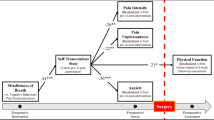Abstract
Purpose
The pain experience is highly variable among patients. Psychological mindsets, in which individuals view a particular characteristic as either fixed or changeable, have been demonstrated to influence people’s actions and perceptions in a variety of settings including school, sports, and interpersonal. The purpose of this study was to determine if health mindsets influence the pain scores and immediate outcomes of post-operative surgical patients.
Methods
As part of a multi-institutional, prospective, randomized clinical trial involving patients undergoing a minimally invasive pectus excavatum repair of pectus excavatum, patients were surveyed to determine whether they had a fixed or growth health mindset. Their post-operative pain was followed prospectively and scored on a Visual Analog Scale and outcomes were measured according to time to oral pain medication use.
Results
Fifty patients completed the Health Beliefs survey, 17 had a fixed mindset (8 epidural, 9 PCA) and 33 had a growth mindset (17 epidural, 16 PCA). Patients with a growth mindset had lower post-operative pain scores than patients with a fixed mindset although pain medication use was not different.
Conclusion
This is the first usage of health mindsets as a means to characterize the perception of pain in the post-operative period. Mindset appears to make a difference in how patients perceive and report their pain. Interventions to improve a patient’s mindset could be effective in the future to improve pain control and patient satisfaction.


Similar content being viewed by others
References
Dweck CS (2008) Mindset: the new psychology of success, Ballantine Books trade pbk. ed. Ballantine Books, New York
Dweck CS, Chiu C, Hong Y (1995) Implicit theories and their role in judgments and reactions: a world from two perspectives. Psychol Inq 6:267–285
Halperin E, Russell AG, Trzesniewski KH, Gross JJ, Dweck CS (2011) Promoting the Middle East peace process by changing beliefs about group malleability. Science 333:1767–1769
Heyman GD, Dweck CS, Cain KM (1992) Young children’s vulnerability to self-blame and helplessness: relationship to beliefs about goodness. Child Dev 63:401–415
Crum A, Zuckerman B (2017) Changing mindsets to enhance treatment effectiveness. JAMA 317:2063. https://doi.org/10.1001/jama.2017.4545
Blackwell LS, Trzesniewski KH, Dweck CS (2007) Implicit theories of intelligence predict achievement across an adolescent transition: a longitudinal study and an intervention. Child Dev 78:246–263. https://doi.org/10.1111/j.1467-8624.2007.00995.x
Yeager DS, Trzesniewski KH, Dweck CS (2013) An implicit theories of personality intervention reduces adolescent aggression in response to victimization and exclusion. Child Dev 84:970–988. https://doi.org/10.1111/cdev.12003
Crum AJ, Langer EJ (2007) Mind-set matters: exercise and the placebo effect. Psychol Sci 18:165–171. https://doi.org/10.1111/j.1467-9280.2007.01867.x
Mueller CM, Fotuhi O, Wright R et al Health mindsets predict health outcomes for adolescents with type 1 diabetes (unpublished data)
Crum AJ, Corbin WR, Brownell KD, Salovey P (2011) Mind over milkshakes: mindsets, not just nutrients, determine ghrelin response. Health Psychol Off J Div Health Psychol Am Psychol Assoc 30:424–429. https://doi.org/10.1037/a0023467 discussion 430–431.
Mueller CM, Wright R, Manke K et al The role of health mindset in adolescents’ perceptions of illness (unpublished data)
Mueller C, Rowe ML, Zuckerman B (2017) Mindset matters for parents and adolescents. JAMA Pediatr 171:415. https://doi.org/10.1001/jamapediatrics.2016.5160
Brown M, Rojas E, Gouda S (2017) A mind–body approach to pediatric pain management. Children 4:50. https://doi.org/10.3390/children4060050
Dijkers M (2010) Comparing quantification of pain severity by verbal rating and numeric rating scales. J Spinal Cord Med 33:232–242
van Dijk JFM, van Wijck AJM, Kappen TH et al (2012) Post-operative pain assessment based on numeric ratings is not the same for patients and professionals: a cross-sectional study. Int J Nurs Stud 49:65–71. https://doi.org/10.1016/j.ijnurstu.2011.07.009
St. Peter SD, Weesner KA, Weissend EE et al (2012) Epidural vs patient-controlled analgesia for post-operative pain after pectus excavatum repair: a prospective, randomized trial. J Pediatr Surg 47:148–153. https://doi.org/10.1016/j.jpedsurg.2011.10.040
Funding
No funding was received to conduct this study.
Author information
Authors and Affiliations
Contributions
JS: data collection, data analysis and interpretation, drafting article, critical revision of article, approval of article, and statistics. SDS: concept and design, data analysis and interpretation, drafting article, critical revision of article, and approval of article. CMM: concept and design, data analysis and interpretation, drafting article, critical revision of article, and approval of article.
Corresponding author
Ethics declarations
Conflict of interest
The authors have no conflict of interest to disclose.
Ethical approval
This article does not contain any studies with human participants or animals performed by any of the authors.
Informed consent
Informed consent was waived by our IRB due to the fact that the data collected for this study were retrospective and de-identified.
Rights and permissions
About this article
Cite this article
Sujka, J., St. Peter, S. & Mueller, C.M. Do health beliefs affect pain perception after pectus excavatum repair?. Pediatr Surg Int 34, 1363–1367 (2018). https://doi.org/10.1007/s00383-018-4354-x
Accepted:
Published:
Issue Date:
DOI: https://doi.org/10.1007/s00383-018-4354-x




